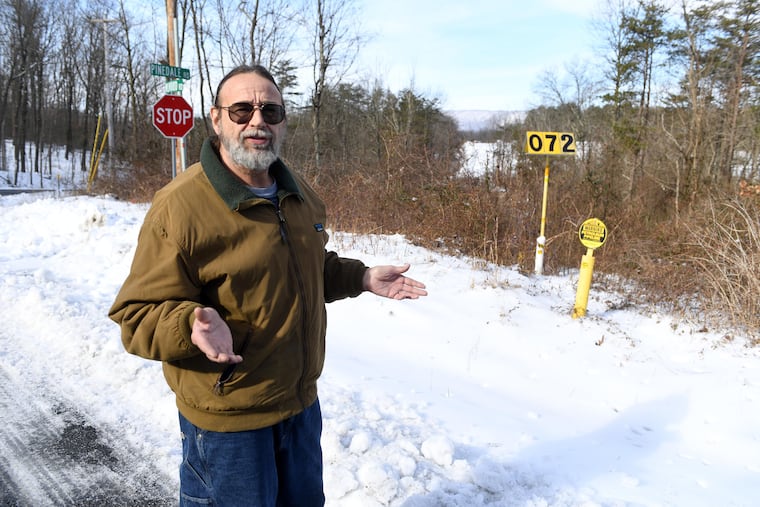Snubbed retiree gets back at Sunoco for canceling a Mariner East pipeline meeting
“Being a private citizen with no legal experience and going up against Sunoco — they had five lawyers there at the hearing and two paralegals ... and win, I’m ecstatic,” said Wilmer Baker.

Sunoco Pipeline LP’s abrupt cancellation of a public pipeline safety meeting near Carlisle, Pa., two years ago was the final insult for Wilmer Baker, a retired steelworker who lives about a quarter-mile from the contentious cross-state Mariner East project.
Baker filed a formal complaint with the Pennsylvania Public Utility Commission in 2018, alleging a litany of bad behavior by Sunoco. He demanded that the PUC order the company to improve safety measures.
This week, he got vindication of sorts when the PUC ordered the pipeline operator to schedule a public awareness meeting within 30 days in Cumberland County. A PUC administrative law judge, who had heard formal testimony last year in Baker’s complaint, chided the company for canceling a July 10, 2018, public safety meeting in Lower Frankford Township on short notice because it suspected that the media and potentially litigious residents would be in attendance.
The PUC also levied a $1,000 fine against Sunoco.
For Baker, a 65-year-old retired foundry worker who represented himself during the PUC’s formal legal process, the commission’s decision was a sweet victory.
“Being a private citizen with no legal experience and going up against Sunoco — they had five lawyers there at the hearing and two paralegals — to be able to challenge Sunoco in court and win, I’m ecstatic,” Baker said Thursday.
But the PUC declined to order the company to adopt the more tangible early-warning measures that Baker sought, such as a leak-detection system on the pipeline, or a requirement that the highly volatile gas liquids carried in the pipeline contain an odorant to alert nearby residents in case of a leak. He also said the PUC should order Sunoco to use only American steel pipe in its project, not imported materials. The PUC said those issues fall under the jurisdiction of federal pipeline safety regulators, not the state.
“We are pleased that the judge and commission ruled in our favor on nearly all of the many allegations raised by this complainant, but we disagree with the assertion that we did not conduct sufficient public outreach in Cumberland County," said Lisa Coleman, a spokeswoman for Energy Transfer LP, the Texas parent company of Sunoco Pipeline. She said the company’s public education and its training programs for emergency responders comply with all appropriate federal and state regulations.
Baker’s case had attracted interest from other Sunoco foes who live along the 350-mile-long Mariner East project. The work involves repurposing an existing pipeline and building two new pipelines to carry fracked gas liquids such as propane and ethane from the Marcellus Shale region to a Delaware River export terminal in Marcus Hook.
Opponents allege that the project is unsafe, and the company’s construction methods have caused a series of harmful sinkholes and leaks of drilling fluid. In its latest rebuke, Pennsylvania two weeks ago ordered Sunoco to reroute the pipeline for about a mile in Chester County, where several construction-related spills polluted a lake in Marsh Creek State Park.
Baker had increasingly become an irritant for Sunoco by 2018 over its plans to build two new pipelines near his three-acre property in Lower Frankford, just seven miles northwest of Carlisle.
In his legal brief, handwritten and buttressed with hundreds of pages of documentation, Baker said Sunoco ceased sending required safety notices to his home, despite its being within a radius from the pipeline that requires periodic notice. He also said that Sunoco’s cancellation of a public meeting in 2018 amounted to a violation of the company’s legal requirements.
Baker’s complaints got a sympathetic hearing from Administrative Law Judge Elizabeth H. Barnes, who has heard most PUC cases involving the Mariner East project. Sunoco argued that it complied with requirements for sending out safety notices, and that there is no legal requirement for it to be present at public meetings. But Barnes found that a public utility company “owes a duty to inform and educate those members of the public residing, working, and congregating” near its pipeline.
Sunoco, in response to Barnes’ initial decision, said that the hearing officer “had improperly usurped Mr. Baker’s complaint and acted as his advocate in order to rewrite the law applicable to [Sunoco Pipeline] on public awareness requirements.”
But the PUC, whose Sept. 10 order was released to the public on Wednesday, agreed with the judge that Sunoco’s actions had failed to meet the legal requirement that the company act in a “reasonable manner” in conducting public outreach. It ordered Sunoco to schedule a public meeting in Cumberland County, though with an acknowledgment of the coronavirus pandemic, said the meeting could be held online.
“I hope it will bring an openness to this pipeline, which is very dangerous, and maybe put on safeguards that should be put in place,” Baker said Thursday.
The Sunoco spokeswoman, Coleman, said the company is “evaluating our options” about a response to the PUC’s order.